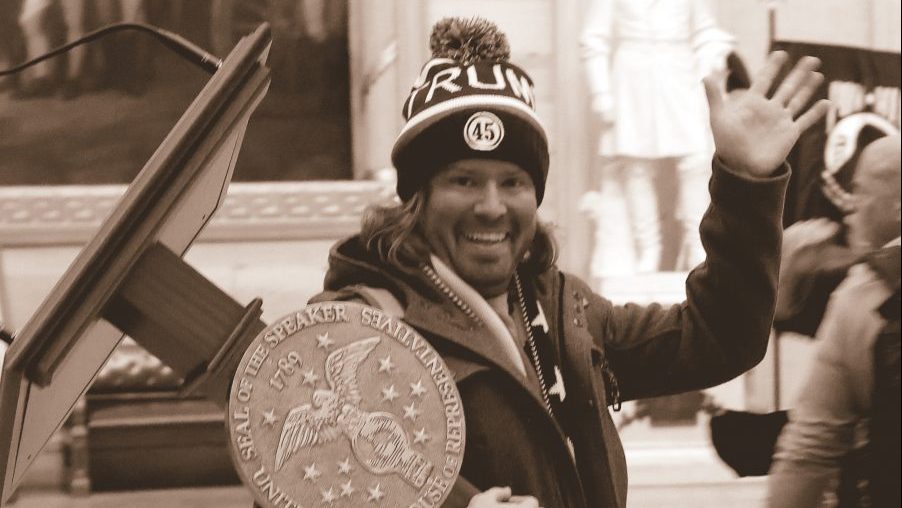A year after the storming of Capitol Hill it’s now clear: this was an event that will shape the rest of the century, not just for Americans but for everyone else on earth. Because this was no mere riot. It was an insurrection.
And though it failed, it has opened the prospect of a permanently fragile US democracy. America is now a state where, every four years, two bitterly hostile political tribes will contest the legitimacy of the elected leader, until something breaks.
Most people are still unaware of how close Trump came to cancelling the result of the election he lost. But the details are coming thick and fast, through memoirs, court documents and a Congressional investigation.
We are certain that Trump’s strategy was to force Mike Pence to enact a vice-presidential coup on 6 January. The plan was set out by his advisor, John Eastman, and co-ordinated from a “command centre” in the historic Willard Hotel by Trump’s close aides Rudy Giuliani and Steve Bannon.
Seven Republican-controlled states, where the Democrats had won, would submit “alternative” results; Pence would set those states’ results aside, leaving Trump with a 10-vote majority in the electoral college. In the ensuing furore the whole election would be thrown back to state legislatures – leaving Trump as President.
You only need to imagine the outrage that would have triggered to understand why Trump needed an angry mass of people on hand.
Trump’s campaign organisations funnelled money into the mobilisation on the day; Trump himself – in an unscripted departure from his speech – urged people to march on Congress and “fight like hell”.
Evidence against the 52 rioters facing conspiracy charges – from the far-right Proud Boys organisation and from the Oath Keepers militia – shows they thought they were there to storm the legislature and take hostages.
No-one knows the motives of the masked man who left two pipe bombs at the two party HQs on the day, because – despite extensive video footage of his actions – he has not been found.
The question remains: was there a direct chain of command between Trump’s people and the insurrectionists? But it’s a secondary question.
It is already clear that, while the violence unfolded, Trump and Giuliani made calls to at least one Republican senator, urging him to delay ratification of Biden as president. That suggests Trump was actively using the pressure of the mob – who at this very moment were roaming the corridors of Congress looking for lawmakers to attack – to achieve his plan.
That is the issue the Congressional 6 January Committee is homing in on: “conspiracy to prevent, hinder or delay the execution of any law” is a criminal offence in the USA.
In response, both Bannon and Trump’s chief of staff Mark Meadows have refused to testify before it – placing themselves legally at risk of prosecution. Meanwhile there have been no prosecutions, nor even announcements of investigations, into the political figures who designed and implemented the attempted coup.
And that is the potential democracy killer. Trump’s allies have wasted no time during 2021, passing laws to deter voting, to gerrymander electoral districts and to politicise the vote-counting mechanisms at the next election. They are determined to engineer a victory for Trump, or a surrogate candidate in 2024, even as his electoral base of elderly white racists shrinks due to demographic change.
At state level, meanwhile, they are mounting blatant challenges – to abortion rights and to anti-racist teaching in schools – designed to neuter the power of the federal government to uphold the civil rights guaranteed in The Constitution. In response, the US state has merely prosecuted the small fry from January 6th. So, in effect, the insurrection continues.
And this is no elite pastime. There is now a mass movement in America engaged in what I’ve called “performative self-deception” – people determined to believe and act upon the myths of white supremacy, anti-feminism, science denial over Covid and climate change; and addicted to disinformation. This was the movement lampooned to cruelly, and so scarily, in the Netflix movie Don’t Look Up.
In the long-term it’s a question of dissuading them. In the short term they have to be defeated – politically, legally and where necessary using law enforcement. That’s what the German-American legal scholar Karl Loewenstein meant in the 1930s when he urged Western leaders to adopt a “militant democracy” in the face of fascism.
Until we take insurrection decisively off the American political agenda, the instability of USA will go on destabilising the world. The Afghan fiasco happened, ultimately, because Joe Biden needs to be more concerned with defending Washington against men with guns, than defending Kabul. Likewise, Russia’s threat to invade Ukraine is strengthened by the fact that a divided USA cannot project meaningful geopolitical power.
At no point since 1945 have Western democracies faced a threat as bleak as this. The threat lies not in the rise of China or the belligerence of Russia: the emergence of great power rivalries is now a fact, and we can deal with it.
The threat is the collapse of democracy in America, with all the domino-effects that would create for ourselves and our European neighbours.
Paul’s latest book How To Stop Fascism is published by Penguin.





